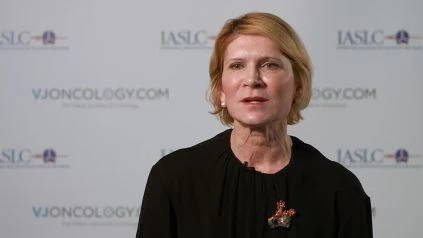Barbara Melosky, MD, FRCPC, of the University of British Columbia, Vancouver, BC discusses how the world of epidermal growth factor receptor (EGFR) mutating lung cancers has changed in terms of management, understanding, and the choices which are available. Research is investigating which patients might benefit from certain medications, as choice is expanding with each generation of drugs. There are first-generation EGFR tyrosine kinase inhibitors (TKIs); gefitinib, and erlotinib, second generation EGFR TKIs; afatinib, dacomitinib, and third generation; osimertinib. Dr Melosky is most excited about AURA3 data for osimertinib (NCT02151981). The choices today in the first-line setting for patients depend on the type of EGFR mutation. Mutation types are broken up into 3 categories; exon 19 deletion, exon 21 L858R, and an uncommon mutation. Following determining mutation type, it is important to communicate and educate the patient on, for example, survival rates. LUX-Lung 3 and 6 trial data has shown that exon 19 deletion has an overall significant survival benefit (NCT00949650 and NCT01121393) and in young patients, it is important to communicate this. From the LUX-Lung 7 Phase II trial, there was an observed improvement in progression-free survival (PFS), time to treatment failure, and interestingly, a 30% improvement in response rate by RECIST criteria for the exon 21 L858R mutation (NCT01466660). Another lesson to learn is that for patients with exon 21 L858R mutation needing a robust response, the best choice of drug is afatinib. For patients who are elderly, live far away from a cancer center, or where communication is poor, gefitinib may be a good choice according to Dr Melosky. AURA3 data might show that patients who develop an exon 20 T790M mutation are suited to osimertinib. From LUX-Lung 7 data, in patients either on gefitinib or afatinib that went on to osimertinib, survival is approaching 4-5 years. In conclusion, the future is looking bright for EGFR mutation patients, and hopefully this is becoming a chronic disease. Recorded at the 2016 World Conference of Lung Cancer (WCLC) of the International Association for the Study of Lung Cancer (IASLC) in Vienna, Austria.
[the_ad id="32629"]

